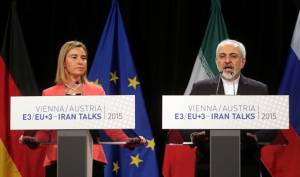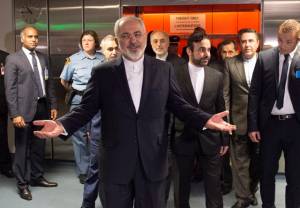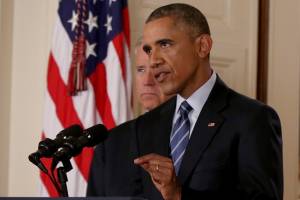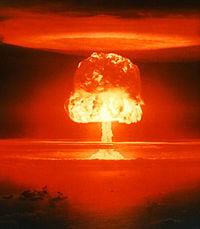The P5+1 powers and Iran have finally signed a bad deal, which essentially gives Iran a green light to develop nuclear weapons, provides the terror-supporting regime with billions of dollars to further finance global terror and will now send the Middle East spiraling into a nuclear arms race.

EU High Representative for Foreign Affairs Federica Mogherini and Iranian Foreign Minister Mohammad Javad Zarif. (AP/Ronald Zak)
After a decade of negotiations, world powers and Iran have formally announced a comprehensive nuclear accord on the Islamic Republic’s nuclear program on Tuesday.
Federica Mogherini, the European Union’s foreign policy chief, appearing on stage with Iranian Foreign Minister Mohammad Javad Zarif said “today is an historic day.” She said it was a great honor “for us to announce that we have reached an agreement on the Iranian nuclear issue.”
“We are creating the conditions for building trust,” she added. “No one ever thought it would be easy. … Despite twists and turns in the talks, hope and determination enabled us to overcome all the difficult moments.”
She maintained that the deal involves Iran “under no circumstance” obtaining or building nuclear weapons.
Secretary of State John Kerry said the Iran deal he spent the last 19 days negotiating in Vienna is “the good deal that we sought.” Throughout nearly two years of talks, US officials have said that “no deal is better than a bad deal.”
Attempting to defend the deal, Kerry that the US and its partners would have finished the negotiations a long time ago had they been willing to settle for a lesser deal.
“We were determined to get this right and I believe our persistence paid off,” Kerry told reporters at a news conference in Vienna, adding that the agreement marked a historic day.
On crutches and still nursing a broken leg, Kerry also joked that Tuesday was a historic day for him personally because it was the first time in six weeks he had worn a pair of shoes.
Details On the Dubious Deal Emerge

An elated Iranian Foreign Minister Mohammad Javad Zarif. (Joe Klamar/Pool Photo via AP)
A senior diplomat told AP the deal includes a compromise between Washington and Tehran that would allow UN inspectors to press for visits to Iranian military sites as part of their monitoring duties, but access at will to any site would not necessarily be granted and even if so, could be delayed, a condition that critics of the deal say will give Tehran time to cover any sign of non-compliance with its commitments and conceal elicit nuclear activity.
Under the deal, Tehran would have the right to challenge the UN request and an arbitration board composed of Iran and the six world powers that negotiated with it would have to decide on the issue.
Still, such an arrangement would be a notable departure from assertions by top Iranian officials that their country would never allow the UN’s International Atomic Energy Agency (IAEA) into such sites. Iran has argued that such visits by the IAEA would be a cover for spying on its military secrets.
Iran’s acceptance in principle of access to military sites will give the agency extra authority in its attempts to go to the site and its demands — previously rejected by Tehran — to interview scientists it suspects were involved in the alleged nuclear weapons work.
Preliminary reports indicate that the US collapsed on the arms embargo against Iran. Just last week, US Chairman of the Joint Chiefs of Staff General Martin Dempsey told the Senate Armed Services Committee that “under no circumstances should we relieve pressure on Iran relative to ballistic missile capabilities and arms trafficking.”
Multiple news outlets report that the embargo on conventional weapons will be lifted no later than 5 years from now, and that the embargo on ballistic missiles will expire in 8 years. However, no one in the region is going to wait for those embargoes to expire and will rush to build up their stockpiles, setting off a nuclear arms race in the region.
Moscow, in particular, hopes to expand military cooperation and arms sales to Tehran, including the long-delayed transfer of S-300 advanced air defense systems —a move long opposed by the United States.
Regarding Iran’s nuclear research and development, the Obama administration reportedly conceded that the Iranians would be allowed to keep their existing centrifuges, this in contrast to what Congress was told – that Iran would be forced to dismantle its centrifuge program.
The deal will go to the UN Security Council (UNSC), which is expected to endorse by the end of the month, to start the mechanics of implementation — long-term, verifiable limits on Iranian nuclear programs that could be used to make weapons in exchange for an end to sanctions on the Islamic Republic.
“No Deal Means War in the Middle East”

President Barack Obama. (AP/Andrew Harnik)
As the Mideast falls into a nuclear arms race, President Barack Obama, speaking from the White House, said “we have stopped the spread of nuclear weapons.”
He asserted that the deal “is not built on trust, it is built on verification,” and that “all of Iran’s pathways to a nuclear weapon were cut off” in this “landmark deal.”
The president said Iran will remove two-thirds of its installed centrifuges and get rid of 98 percent of its stockpile of uranium.
In exchange, Iran will receive phased in sanctions relief as it fulfills the provisions in the deal.
Defending his accord that will now face 60 days of scrutiny by Congress, Obama said “no deal means a greater chance of more war in the Middle East.”
Congress can block the deal if two thirds of its members vote against the agreement. However, Obama threatened he will veto any legislation that blocks the Iran deal.
He urged lawmakers to consider the repercussions of their actions. He painted a grim scenario in which the rest of the world struck its own nuclear deals with Iran, leaving the US isolated in its sanctions.
Without the limitations and verifications included in the deal announced Tuesday, Obama claimed he or a future president would be more likely to face a decision about using US military action to prevent Iran from building a bomb.
Speaking from Tehran simultaneously as Obama made his statements, Iranian President Hassan Rouhani said “a new chapter” has begun in relations with the world and the Islamic Republic.
“The sanctions regime was never successful but at the same time it had affected people’s lives.”
Rouhani dismissed claims that the Islamic Republic sought to make atomic weapons under its nuclear program. “The whole world knows very well that manufacturing a nuclear bomb … is considered forbidden.”
The deal is a “bad mistake of historic proportions,” Israeli Prime Minister Benjamin Netanyahu warned, adding that it would enable Iran to “continue to pursue its aggression and terror in the region.”
By: Max Gelber, United with Israel. AP contributed to this report.

Sign the Petition to Stop a Nuclear Iran
The US Congress must ensure that sanctions against Iran remain in force until the nuclear threat is completely eliminated.
I strongly oppose easing sanctions before the nuclear threat from Iran has been eliminated. Allowing Iran to enrich uranium without being subject to 'anytime, anywhere' inspections is extremely dangerous and unacceptable. Iran's nuclear program must be stopped.
See our Privacy Policy